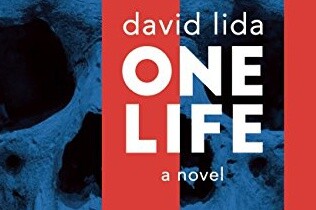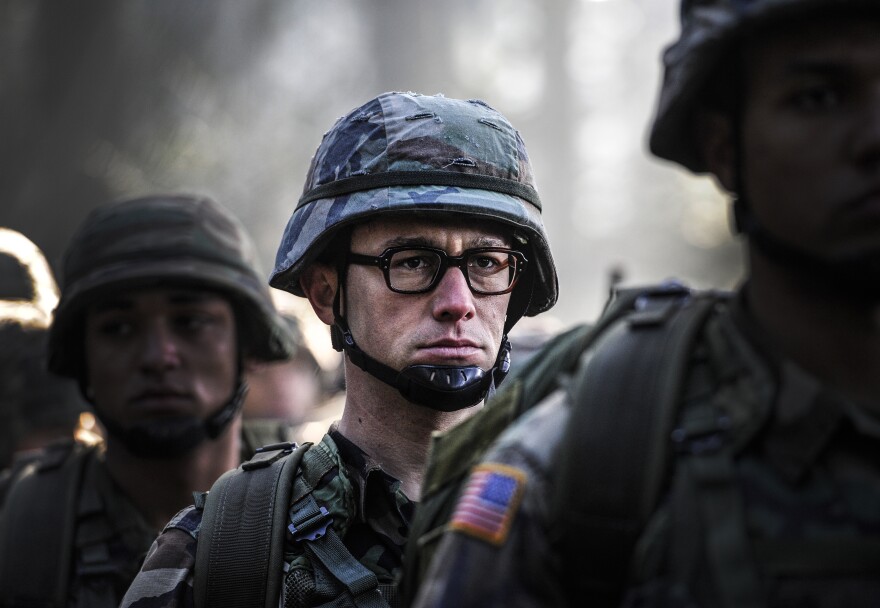Author Jeff Chang discusses his new book, "We Gon' Be Alright," Joseph Gordon-Levitt discusses his controversial role as "Snowden", and a vintage train that takes passengers to Santa Barbara's wine country.
The number of non-white children in poverty is a 'moral and economic crisis' for California
A new census report made headlines Tuesday touting a 5 percent rise in median income in the US. But that same report contains startling data about children in poverty in America.
In California, children make up less than one-quarter of the state's population, but they account for nearly one-third of those living below the poverty line. There were, in total, 1.9 million poor children living in the Golden State in 2015 — many of them children of color
Statewide, black and Latino children are nearly three times as likely as white children to live in poverty. In Los Angeles, almost 80 percent of the children in poverty are Latino.
To get a better understanding about the state of child poverty, Take Two’s Deepa Fernandes spoke with Alex Johnson, Executive Director of Children's Defense Fund California.
Highlights
What does the Census data tell us about child poverty?
We are in the midst of a moral and economic crisis with the number of children of color who continue to be disproportionately poor. There are about 1.3 million Latino children living in California who are poor and about 150,000 or so black children who are poor in California. That represents really a crisis for us as a state and as a nation in terms of the number of children of color who persist in poverty.
Where do poor children live in Los Angeles?
It’s poverty all across the county and across the city. You have about 30 percent of black children who are poor in the county. In the city, about 38 percent who are poor. Of Latino children, the number is the same in the city and about 30 percent again in L.A. County. They’re spread all across the county. A lot of the young folks that we have engaged with the Children’s Defense Fund — because of their circumstances, because of poverty, are having to move all over so they are transitioning across the county from cities, from couches, from garages — so there’s no stability in housing. And that in itself is a significant issue as it relates to education. It relates to a child’s ability to thrive.
Are better paying job for parents the solution?
If a parent has a good paying job, that's obviously helpful and so the fight for a minimum wage of $15 an hour was a part of that equation to help parents help themselves and their families get back on the road to success but we have to look at where poverty stems from. So, from the systemic and structural disadvantages, the oppression, the structural racism — let’s just call is out — that is ensconce within the notion of what poverty means. So you can’t just say, ‘Oh they should just go get a job’. We have to peel back the layers and look at how these families are actually getting into poverty. Poverty is cyclical and you have generational poverty that persisted particularly among communities of color because of those very issues. Until we address that, along with legislative changes and along with pushing for more economic opportunities, we won’t see a really true regression in these numbers of poverty.
"We Gon' Be Alright": Jeff Chang's new book sheds light on race in America
Author Jeff Chang’s new book, “We Gon' Be Alright: Notes On Race and Resegregation,” takes a hard look at the causes of current racial and cultural conflict in America
In a series of critical essays, Chang examines what he refers to as “the resegregation of America” and argues that this phenomenon plays a large role in recent racial strife ranging from the wave of officer involved shootings of African Americans to activist responses in movements like Black Lives Matters and Oscars So White.
Chang asserts that as a nation, we fail to call resegregation by its name and that confronting it for what it is, will be critical to achieving racial and cultural equality.
Take Two’s Deepa Fernandes spoke with Jeff Chang about the book and his take on the role of race in America today.
To hear the full interview, click the blue arrow above.
How Joseph Gordon-Levitt came to think of Snowden as 'patriotic'
When he was tasked with playing Edward Snowden in the new Oliver Stone movie "Snowden," Joseph Gordon-Levitt was interested, but he wasn't sure who the guy was, "I asked myself, wait ok, Edward Snowden. I know I know that name, but what exactly did he do and which one was he? And why? I realized I just didn't know."
Soon thereafter he figured things out. Gordon-Levitt studied up on the former CIA analyst turned whistleblower and sat down with him during a trip to Russia.
"He comes from a family where he's brought up to want to fight for his country. He's extremely patriotic," said Gordon-Levitt in an interview with Take Two's Alex Cohen. "And I know it sounds funny almost to use the word patriot and the word Snowden in the same sentence, because we've heard so often about how he undermined the country, but I came to believe personally that what he did was extremely patriotic."
If you'd like to hear how the actor prepared for his role as Snowden, click on the audio embedded at the top of this post.
LA band Saint Motel blends indie pop and virtual reality
Last spring on Take Two, we introduced you to a local band called Saint Motel.
The group began when singer A/J Jackson and guitarist Aaron Sharp met while attending film school at Chapman University here in Southern California.
Things went very well very quickly. The band had a number of hits including their song "My Type":
The song can now be heard in video games and ads for cell phones. HBO used another one of their songs to promote the hit show "Boardwalk Empire."
Saint Motel wowed the crowds at Coachella last year, and they're showing no signs of slowing down.
They've got a new album out next month called saintmotelevision. On Friday, they'll be performing tracks from the album at The Belasco Theater in downtown L.A.
And if you can't make it there in person, there's no need to worry. Saint Motel has created what they call "virtualizers" for their new songs "Move" and "You Can Be You," combining 360-degree animation and virtual reality technology to create a fully immersive experience.
Here's Saint Motel's "Move":
And "You Can Be You":
A/J Jackson says the hope for these "virtualizers" is that they'll feel like something completely new-- kind of like you're walking into the song itself.
"There's not a separate narrative, like a music video. It's not just a lyric video. And it's not just a live performance of it. It's a mixture of live performance, the lyrics, and some sort of animated world that kind of represents the tone of the song."
Depending on how you're watching it— on your computer, your phone, or with a VR headset— the experience will be a little different. While the whole idea sounds pretty futuristic, Jackson says it's also a bit of a throwback too.
"You can kind of sit in the room of the song. Kind of like when you used to have an album as a kid and you would just sit and listen to it in your room."
And for a band that's known for putting on exciting live shows, Saint Motel isn't too worried that VR will replace the experience of being there in person.
"You've got the vibrations, you've got the smells, you've got the hot sweat," Jackson says. "There's something obviously tangible about the real experience. And there's nothing wrong with just closing your eyes and just listening to the music. That's absolutely important. This is just another way to experience it."
To hear the full interview with A/J Jackson and Aaron Sharp, click the blue player above.
New documentary examines the human side of Mexico's drug war
In the Mexican city of Monterrey, there is a scene that plays out that is both unusual, and all too common. A mother summons the courage to make eye contact with the local district attorney. She struggles for words, tears dot her face.
She wants to know where her teenager is, he's been missing for over a year. Monterrey is often described as the center of the Mexican Drug War. Tens of thousands of regular folks have disappeared, and the authorities who should be finding them are instead believed to be part of the problem.
In some cases, they're actually responsible for the disappearances and are working with the cartel groups. A new documentary takes us into to the epicenter of this drug war, and the lives it roils as it plays out on the southern border.
From those who have trafficked drugs into the U.S., to a border patrol agent who is leading the charge to bring down the cartels, to the mothers, family members, and a nun, who are fighting to bring the disappeared back.
For more, Bernardo Ruiz, director of the new POV PBS documentary "Kingdom of Shadows," spoke to Take Two's Deepa Fernandes.
To hear the full interview, click the blue play button above.
High school hazing in the spotlight with Dos Palos case
Four high school football players are under arrest this week in the Central California town of Dos Palos.
Dos Palos police chief Barry Mann says they are connected to a hazing incident of an underclassmen, and that the case is so severe that his department does not plan to release any details.
He warns that if information does leak out in the course of prosecution, then residents should "prepare themselves to be shocked."
Emily Pualwan, executive director of HazingPrevention.org, says less is known about hazing in high school compared to incidents in college.
But research does indicate that happens more within sports teams and is more sexual in nature.
Take Two talks with Pualwan for more.
Sips and trips: All aboard the Vino Train
For wine lovers looking for a pretty backdrop this weekend, why not a train car headed to Santa Barbara along the beautiful California coast? A vintage train, no less.
For seven years, the Vino Train has ferried passengers from Union Station to Santa Barbara's wine country in classic, post-war style. The trip features two historic cars from the heyday of train travel.
Bill Hatrick is the brain behind the Vino Train. He shared its history with Take Two.
Press the blue play button above to hear the full interview.
Can a smiling selfie a day lead to a happier life?
What makes you happy?
Family? Giggling children? Maybe ice cream? According to a new study from the University of California, Irvine, taking selfies - while smiling - can put you on the road to happiness.
Perhaps the queen of the smartphone snap, Kim Kardashian is on to something.
For more, researcher Yu Chen spoke with Take Two's Deepa Fernandes. She began by explaining the methodology behind the study.
Interview Highlights
On the study's initial findings:
"We asked our students to take a selfie while they're smiling, every day for three weeks and we found that they're feelings have been becoming more positive and also some of the participants they reported they're becoming more confident and also comfortable in taking their selfies."
On the methodology:
"We designed the study in a way that we have one week control and also three-week intervention session. So during the one week control session, they did nothing but record their mood using the app that was provided three times per day. That serves as the baseline for mood. And then, for the following three weeks, in addition to recording their emotions three times per day they also took a selfie while they're smiling every day for three weeks. So we compare their self-reported moods during the first week and the following three weeks while they were taking selfies."
You also had some students take a photo of something that would make somebody else happy and send it to them. I found that fascinating, talk about why.
"So that was inspired by a recent study showing that giving makes other people happy. So basically, either for selfie or taking something that makes yourself happy, those are more self-focused. We were wondering, if we are turning the lens towards other focus, would that make people happy? So that motivated us to conduct that condition of taking photos."
To hear the full interview, click the blue play button above.
Reading by moonlight: literary awards and fall picks
For those who prefer to stay home curled up with a good book, we've got you covered there, too. Our book guy David Kipen came in for Take Two's monthly literary segment, reading by moonlight.
David broke down some standouts from The National book awards, PEN awards and even gave some insight into some of the diversity issues surrounding literary award season. As always he also had some great book selections for our listeners.
"One Life" By David Lida

"He's a terrific writer, from the United States, but lived in Mexico city for many years where he's written a terrific blog for years and years. This is his first novel. It's about what he is. It's about a mitigation specialist, somebody who basically doesn't get people off, gets people's sentences reduced, especially for trans-border cases. And of course, this lends itself to a mystery to a thriller, which this book is and is not. It's also really thoughtful."
"Wedding Bush Road" By David Francis

"He is a human rights lawyer in Los Angeles, and he somehow finds time to write terrific books every couple years. This one is sort of half set in Australia half set in Los Angeles and I have really really high hopes for it. Fascinating guy."
To hear the full interview, click the blue play button above.




